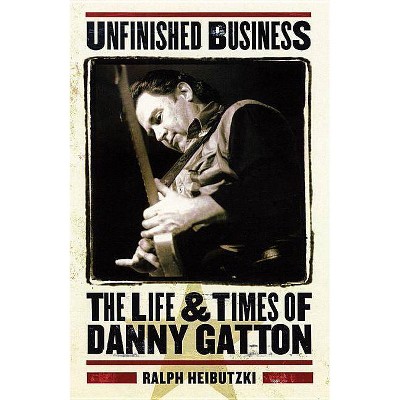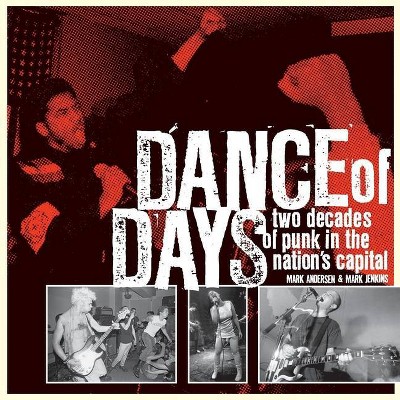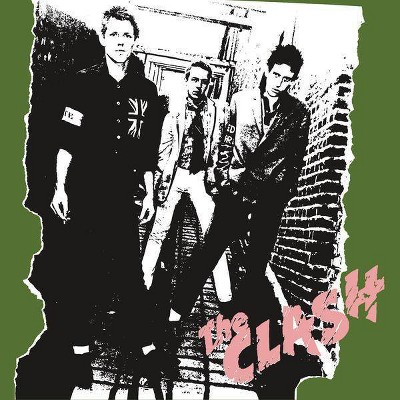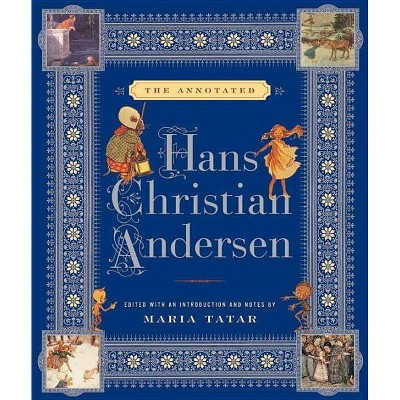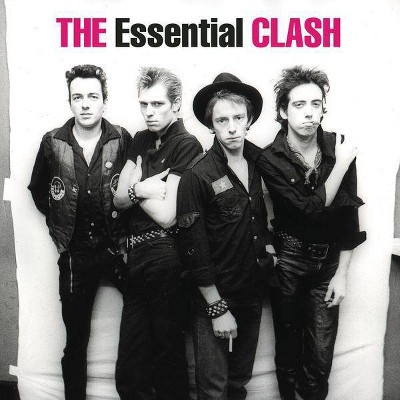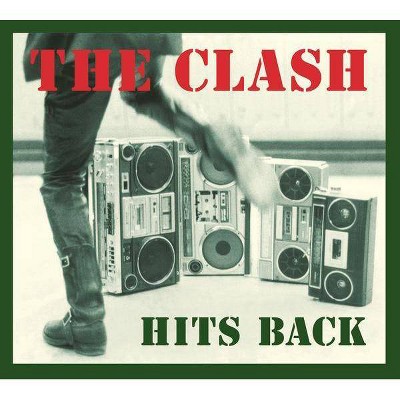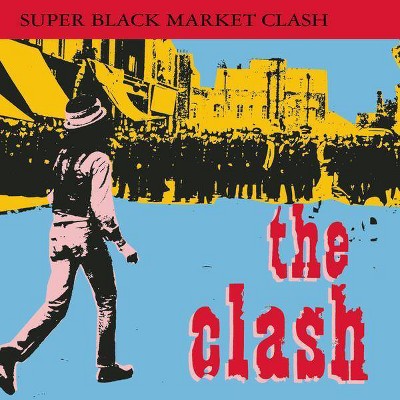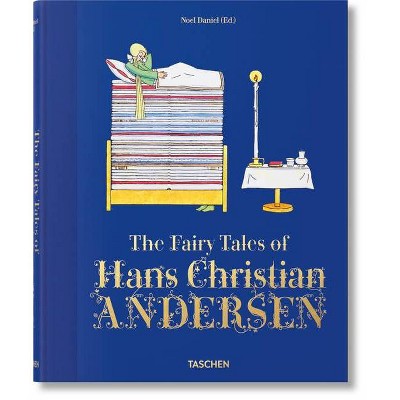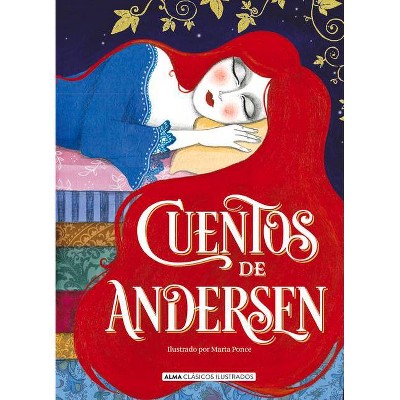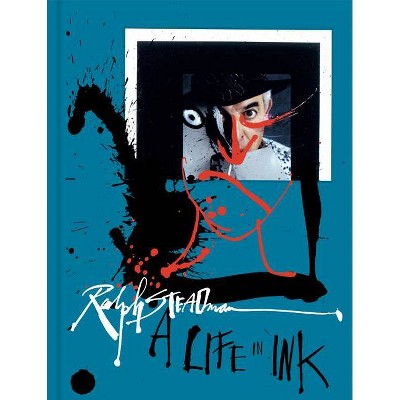We Are the Clash - by Mark Andersen & Ralph Heibutzki (Hardcover)
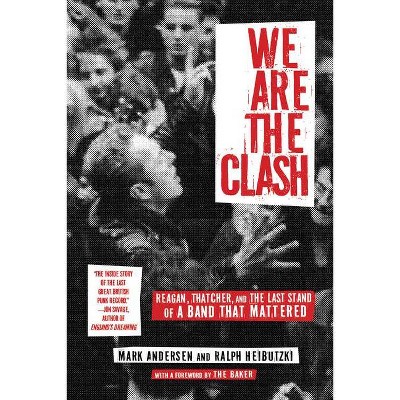
Similar Products
Products of same category from the store
AllProduct info
<p/><br></br><p><b> About the Book </b></p></br></br><p>An impassioned history of the final, turbulent years of The Clash under the dark shadow of Reagan and Thatcher.<p/><br></br><p><b> Book Synopsis </b></p></br></br><p>The Clash's final chapter, after guitarist Mick Jones' 1983 departure, has largely been forgotten--until this book, in which authors Mark Andersen and Ralph Heibutzki argue that the punk pioneers were still creating vital music to the very end.<br>--<b><i>Rolling Stone</b></i>, an RS Picks / New Books<p>A <i><b>BookRiot</b></i> Loved pick for July!<p>In <i>We Are The Clash</i>, Mark Andersen and Ralph Heibutzki...are more interested in Strummer's strain to re-harness the power of punk to ignite opposition in the cynical Thatcher-Reagan era.<br>--<b><i>The Current</i>'s Rock and Roll Book Club (Minnesota Public Radio)</b><p>The Clash may have not been the best example of integrity in the music world with their careerist opportunism but their message of hope and possibility, cribbed from Reggae and Soul music, is all too important.<br>--<i><b>Maximum Rocknroll</i></b><p>When you think of The Clash, what comes to mind? Their early days in the London punk scene, perhaps, or the triumphant release of London Calling. <i>We Are The Clash</i> focuses on a very different moment in the band's history: the point at which the group splintered in the early 1980s, and its members grappled with an onset of reactionary governments around the world.<br>--<b><i>Vol. 1 Brooklyn</b></i>, included in the July 2018 Book Preview<p>One of the most rewarding music books you'll come across this year...By focusing as much on the politics that motivated the Clash, <i>We Are the Clash</i> becomes a vital political history as much as an account of an underdocumented portion of a band's career. Great music books catalyze critical reconsiderations; <i>We Are the Clash</i> does one better, inviting readers to consider what matters to them: the creative commodities that artists produce? Or the ideals, however complexly and clumsily human they may be, that often compel artists to create in the first place.<br>--<b><i>Johns Hopkins Magazine</b></i><p>A gripping tale of the band's struggle to reinvent itself as George Orwell's <i>1984</i> loomed. This bold campaign crashed headlong into a wall of internal contraditions and rising right-wing power.<br>--<b>Brooklyn Digest</b> (blog)<p>Given the number of books out there about The Clash, this is, as I stated, the only one to take a genuine, unbiased and in-depth appraisal of this era of the band. Given the quality of the writing, this could also be the most essential book about the band.<br>--<b><i>Scanner Zine</b></i><p>The Clash was a paradox of revolutionary conviction, musical ambition, and commercial drive. <i>We Are The Clash</i> is a gripping tale of the band's struggle to reinvent itself as George Orwell's <i>1984</i> loomed. This bold campaign crashed headlong into a wall of internal contradictions, and rising right-wing power.<p>While the world teetered on the edge of the nuclear abyss, British miners waged a life-or-death strike, and tens of thousands died from US guns in Central America, Clash cofounders Joe Strummer, Paul Simonon, and Bernard Rhodes waged a desperate last stand after ejecting guitarist Mick Jones and drummer Topper Headon. The band shattered just as its controversial final album, <i>Cut the Crap, </i> was emerging.<p>Andersen and Heibutzki weave together extensive archival research and in-depth original interviews with virtually all of the key players involved to tell a moving story of idealism undone by human frailty amid a climatic turning point for our world<p/><br></br><p><b> Review Quotes </b></p></br></br><br><p><i>We Are The Clash</i> celebrates the struggle for humanity, both in a band and in the wider world community. Traveling the journey of The Clash's final years is no train in vain. The benefits of understanding history allow readers to see that the future is unwritten, as long as mistakes from the past are not dutifully repeated, but learned from. The Clash, with all of their faults, represented a creative force to be reckoned with. They showed that anger could be power, if one knows how to use it...While <i>We Are The Clash</i> painstakingly shows how The Clash faltered, this book shows how they left a lasting impression. The Clash, as a band, did not overthrow the Thatcher government or even the Reagan White House. They used the power of music to educate through protest anthems and put a hole through the façades perpetuated by right-wing governments. As The Clash did this, they left it to the people to collectively take on the mantle of revolutionary action. Now it's up to you to get this book and enable your future.<br>--<b><i>SLUG Magazine</b></i><p>Thanks to what must've been exhaustive research into contemporary bootleg recordings of live shows and articles chronicling the audience response to the performances, Andersen and Heibutzki provide intensely detailed evidence that this was a band which was firing on all cylinders--especially in a live setting--almost until the very end...Seriously: if nothing else, track down <i>We Are The Clash</i> and read Chapter Eight, 'Movers and Shakers Come On.' It will reaffirm any fandom you might've once lost for The Clash, and for those who've ever doubted them or considered them 'corporate punk, ' it'll give you fresh eyes on the band. It's fucking magical.<br>--<b>Cinepunx</b><p><i>We Are The Clash</i> is an important book in so many ways--and not just because it makes up for a lack of documentation of this period of the band...<i>We Are The Clash</i> was a book screaming to be written. Andersen and Hebutzki have done a stellar job.<br>--<b><i>I-94 Bar</b></i><p><i>We Are The Clash, </i> details expunged history, unreported until now, with a grounding in the socio-political events of the time. It fills in the blanks with a cohesive and well researched understanding of what Joe Strummer attemped, and in many instances, did accomplish.<br>--<b>Skeleton Pete</b> (blog)<p>This is an inspiring take on the rock-band bio format, as much a political history of the 1980s as it is a look at an influential band in its final years.<br>--<b><i>Publishers Weekly</b></i><p>When did the Clash quit being 'the only band that matters'? This fascinating book faces a challenge: documenting the final years of the British band that its record label had promoted with that slogan...The band may no longer have mattered, but its legacy mattered to the authors, who make it matter to the readers. More than a footnote to the rise and fall of one of the last great rock bands.<br>--<b><i>Kirkus Reviews</b></i><p>Coverage is specialized, extending considerably beyond mere behind-the-scenes reportage and deeply explores the sociopolitical context in which the band operated; as such, the tone can be intense (read: punk) and professorial. In all, Andersen and Heibutzki's examination of the band's proletarian stance in light its commerical striving is immensely satisfying.<br>--<b><i>Library Journal</b></i><p>The inside story of the last great British punk record.<br>--<b>Jon Savage</b>, author of <em>England's Dreaming</em><p><em>We Are The Clash</em> tells an important part of the story of both The Clash and punk rock. The repercussions of what went down politically both in the USA and UK back then are still very much felt today.<br>--<b>Kosmo Vinyl, </b> former manager of The Clash<p>At long last, The Clash's final incarnation has been definitively chronicled. Mark Andersen and Ralph Heibutzki have brilliantly filled in the blanks of the 'Clash Mark II' era, including its eventual implosion. Beautifully constructed and brilliantly written...I was riveted, unable to put it down.<br>--<b>The Baker, </b> from the foreword<p>Smash your television and buy this book! <i>We Are The Clash</i> proves, once again, the importance of The Clash, even during their rarely discussed and most maligned period. Situated in the Reagan/Thatcher era, <i>We Are The Clash</i> illustrates why, when Reagan called women like my mom 'welfare queens, ' I bought a ticket to see 'the only band that matters, ' and then went on to start one of my own.<br>--<b>Michelle Cruz Gonzales, </b> author of <i>The Spitboy Rule: Tales of a Xicana in a Female Punk Band</i><p>The Clash are remembered as much for their blistering music as their gritty yet hopeful message to listeners worldwide. In this first serious look at The Clash's music and meaning, post-commercial success, the authors mix thoughtful reflection with grassroots political analysis in an effort to inspire a new generation of music fans and activists to Cut the Crap.<br>--<b>Craig O'Hara, </b> author of <em>The Philosophy of Punk: More than Noise!</em><br><p/><br></br><p><b> About the Author </b></p></br></br><p><b>Mark Andersen</b> is the coauthor of <em>Dance of Days: Two Decades of Punk in the Nation's Capital</em> and author of <em>All the Power.</em> He lives in Washington, DC.<p><b>Ralph Heibutzki</b> (Chairman Ralph) is the author of <em>Unfinished Business: The Life & Times of Danny Gatton.</em> He lives in southwest Michigan.
Price History
Cheapest price in the interval: 44.95 on November 8, 2021
Most expensive price in the interval: 44.95 on December 20, 2021
Price Archive shows prices from various stores, lets you see history and find the cheapest. There is no actual sale on the website. For all support, inquiry and suggestion messagescommunication@pricearchive.us
